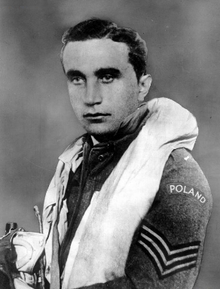Josef František
| Josef František | |
|---|---|
 František, in RAF uniform, wearing a "Poland" nationality title | |
| Born |
7 October 1914 Otaslavice, Austria-Hungary |
| Died |
8 October 1940 (aged 26) Ewell, England |
| Allegiance |
Czechoslovakia Poland France United Kingdom |
| Service/branch |
Czechoslovak Air Force Polish Air Force French Air Force Royal Air Force |
| Years of service | 1934–1940 |
| Rank | Sergeant |
| Unit | 303 Polish Squadron |
| Battles/wars | |
| Awards |
Distinguished Flying Medal & Bar Croix de guerre Virtuti Militari 5th class Cross of Valour (3) |
Josef František DFM & Bar (7 October 1914 – 8 October 1940) was a Czech fighter pilot and World War II flying ace who flew for the air forces of Czechoslovakia, Poland and the United Kingdom. He is famous as being one of the highest scoring Allied aces in the Battle of Britain.
Career
Born in Otaslavice in 1913, Josef František joined the Czechoslovak Air Force in 1934. After basic training he joined the Czechoslovak Air Force Air Regiment 2. In 1935 he was a corporal in Air Regiment 1 and returned to Air Regiment 2 as a sergeant in 1937. In June 1938 he became a fighter pilot serving in the 40th squadron in Prague flying the Avia B-534 and Bk-534 fighter. After Czechoslovakia fell under German occupation (15 March 1939), like many other Czechoslovak airmen, he escaped to Poland. Most Czechoslovak airmen then left Poland for France before the start of the Second World War, though František decided to stay and serve with the Polish Air Force.
During the German invasion of Poland in September 1939, František initially evacuated training aircraft from the air base at Dęblin. From 7 September he flew reconnaissance missions in an unarmed training plane, a RWD-8. On 19–20 September he attacked enemy columns near Kamionka Strumiłowa, throwing hand grenades on the troops below. On 20 September he was shot down near Złoczów, but was saved by a Polish crew that landed nearby. On 22 September František's unit was ordered to withdraw with their remaining aircraft to Romania. František managed to abscond from an internment camp in Romania and reached France via North Africa in October 1939.
In France František elected to remain with the Poles instead of joining the exiled Czechoslovak air force (a probable reason for this decision was a conflict with a Czech officer, who tried to arrest him for insubordination.)
He was flying only old fashioned planes with fixed undercarriage and there are no official French records to confirm he flew combat missions during the Battle of France. After the fall of France František fled to Britain and after training on 2 August was assigned to No. 303 Polish Squadron based at RAF Northolt, flying Hawker Hurricane fighters. The squadron entered action in the last phase of the Battle of Britain. The first confirmed victory of Sgt. František was a German Bf 109E fighter on 2 September 1940.
A very ill-disciplined pilot,[1] he was seen by his commanding officers as a danger to his colleagues when flying in formation. His British CO Squadron Leader Ronald Gustave Kellett, offered to arrange for František's transfer to a Czech squadron, but František preferred to stay and fight alongside his Polish colleagues. As all pilots were valuable, a compromise was created whereby František was allotted a "spare" aircraft so he could fly as a "guest" of the Squadron as and when he wanted to. Thus, František fought his own private war – accompanying the squadron into the air, but peeling off to fly a lone patrol over Kent, patrolling in the area through which he knew the German aircraft being intercepted would fly on their way back to base, possibly damaged and low on fuel and ammo. During the following month he shot down 17 German aircraft and 1 probable, of which 9 were Bf 109s, becoming one of the top scoring Allied fighter pilots of the Battle of Britain. His last victory was on 30 September 1940 and he was awarded the Distinguished Flying Medal.
On 8 October 1940, František's Hurricane crashed in Ewell, Surrey during a landing approach after a patrol. Reasons for the crash are not known, but according to some theories, he may have been making aerobatic figures to impress his girlfriend, or it might have been a result of battle fatigue and physical exhaustion.
He was buried in a Polish military cemetery. He was awarded several decorations, among them the Virtuti Militari 5th class and he was the first foreigner awarded the Distinguished Flying Medal with Bar.
Honours and awards
 Virtuti Militari Silver Cross (Poland)
Virtuti Militari Silver Cross (Poland) Cross of Valour 3 times (Poland)
Cross of Valour 3 times (Poland)Croix de guerre (France)
 Distinguished Flying Medal and bar (United Kingdom)
Distinguished Flying Medal and bar (United Kingdom)
References
- Jiří Rajlich: Josef František in: Lotnictwo Wojskowe nr 2/1999 (in Polish)
External links
- Sergeant Josef Frantisek – The Battle of Britain Hero
- Biography
- Very detailed biography (in Czech)
- Bio in English
- Detailed English biography
.svg.png)
